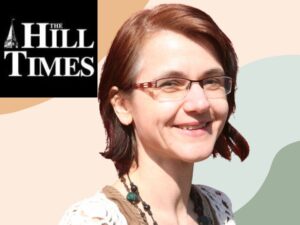Women peace-builders: an investment Canada cannot afford to overlook

Investing in women peacebuilders is not just a moral and effective thing to do, it’s a good financial investment we cannot afford to overlook. The returns are vital and invaluable for all of us and for the planet.
A few years ago, Pélagie sought legal support and counselling from Héritiers de la Justice, a grassroots human rights organization in South Kivu, Democratic Republic of Congo (DRC). This conflict-ridden region is one of the world’s most dangerous places to be a woman.
Today, Pélagie is a human rights trainer and chair of the local grassroots network in her community. Through this network, which helps facilitate Héritiers de la Justice’s programs, she educates women and girls on how to advocate for themselves, including their rights to land and property inheritance, and organizes meetings on peacebuilding and reconciliation with community members and local authorities.
Héritiers de la Justice is a partner in the KAIROS Women of Courage: Women, Peace and Security (WPS) Program, which is funded by Global Affairs Canada and Canadian donors. The program is driven by women-led grassroots organizations that are well-trusted in their communities. They are highly attuned to the supports needed in regions that are rapidly changing due to the climate crisis, conflict and growing income and food insecurities.
Pélagie’s journey is unique, but is also like thousands of other women who are impacted by war and conflict, and who empower themselves through programs such as this one to become effective peacebuilders in countries such as the DRC, Colombia, South Sudan, and the West Bank.
I had the opportunity to meet with Pélagie during a recent exchange in Nairobi, Kenya, between KAIROS WPS partners from the DRC and South Sudan. A highlight of the exchange was hearing about Héritiers de la Justice’s economic empowerment projects for women peacebuilders.
For example, Pélagie outlined the details of an income-generating program that is inherently collective and feminist. Give a survivor and local peacebuilder one piglet and provide training on how to look after it, and she will breed five pigs, give four to other members of the grassroots network and keep one for sale or future breeding, thus expanding and sustaining the program. The resulting economic and food security will increase her individual capacity to participate in peacebuilding and defend human rights, while increasing the grassroots network’s capacity. She will also name her piglet something meaningful and inspiring like “Rhuciseze,” translated as “let’s walk courageously.”
South Sudanese exchange participants connected immediately to this example.
“I will carry this idea back home,” said one participant. “In South Sudan, we have been told by grassroots women and survivors of the conflict that they are committed to reconciliation, and that they want to build peace, but they cannot participate effectively and sustainably if they have nothing to eat or feed their families.”
At KAIROS, we have heard the same message from WPS partners in Colombia and Palestine. WPS and human rights work requires economic empowerment and food security.
Thanks to Canada’s financial support—guided by its innovative Feminist International Assistance Policy (FIAP)—we have witnessed a significant rise in the number of women who are actively strengthening laws, policies, and structures to recognize and protect their rights.
However, our partners and the communities they serve are facing rising income inequality, economic and food insecurities, exacerbated by the pandemic.
Canada’s FIAP is a proven sound policy, but, in its funding priorities, it needs to align the advancement of human rights and women, peace and security with economic empowerment. It also must be fully funded.
Last spring, despite calls from civil society to increase funding, Canada reduced its overseas development assistance (ODA). Today, Canada’s percentage allocation of gross national income is less than half that of the international standard of 0.7 per cent.
Canada must increase its ODA to reach the international standard by 2030, and ensure that these resources are directed to grassroots women’s rights and peacebuilding organizations.
Investing in women peacebuilders is not just a moral, human rights-based, equitable and effective thing to do, it is a sound financial investment, and one that Canada cannot afford to overlook. In today’s world, the returns are vital and invaluable for all of us and for the planet—equitable and sustainable peace with economic and climate justice.
Rachel Warden, KAIROS Canada Partnerships Manager



